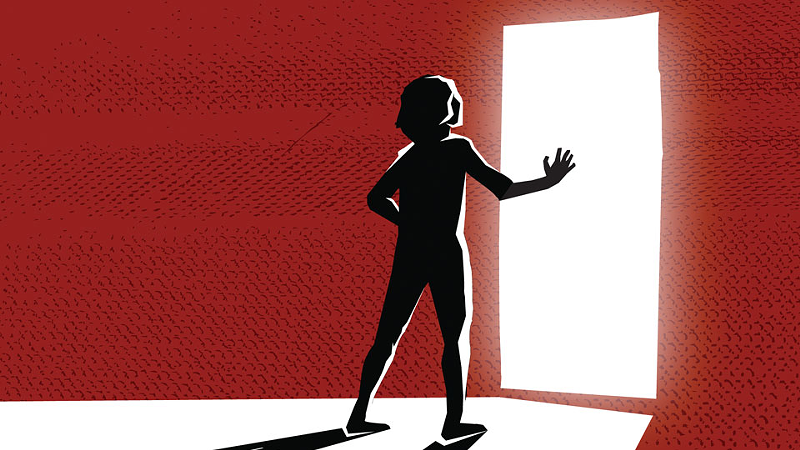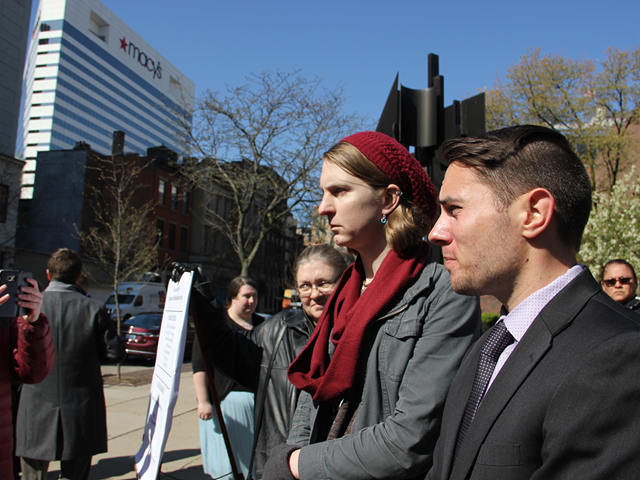
They come through a discrete side door of a landmark building in Over-the-Rhine for different reasons and from different circumstances.
Some walk in proudly, heads thrown back, having found the location thanks to a small card given secretly by outreach workers when their pimps weren’t looking. Others come in somewhat hesitantly, encouraged by social workers they see often and trust.
Each of the dozen or so individuals who walk into the temporary safe space — a no-judgment, no-arrest location set up last month by law enforcement and social service agencies for those caught up in exploitive sex work — faces different challenges.
Abusive pimps. Hunger. Homelessness. Drug addiction. Estrangement from family due to LGBT status.
A new initiative called “A New Day, A New Beginning” demonstrates one facet of a change in the way agencies and law enforcement are trying to address sex trafficking and the tight knot of related issues that play into it. The program seeks to provide comfort and affirmation, treating sex workers not as criminals, but as individuals who need support and empowerment.
Other initiatives like the Hamilton County CHANGE Court — which allows those who have been sex trafficked to get treatment and therapy instead of serving jail time — also seek to shift the focus away from treating sex workers as criminals.
“Living out there and doing that kind of work, you have someone watching you every step,” says Isaac Wright, a social worker with Lighthouse Youth Services who helped facilitate the event. “So it’s nice for them to come into a place and not be told what to do. You’re giving some power back to them.”
Waiting for them on the other side of the door are social service organizations like Light House’s Youth Outreach and Safe and Supported programs, Cincinnati Union Bethel’s Off the Streets Program, Talbert House, Greater Cincinnati Behavioral Health Services, the Salvation Army, a chemical dependency clinic called Brightview, the Freestore Foodbank and others.
On offer: addiction treatment, paperwork for benefits, safe houses, ways to get away from the danger they face out on the streets.
Before all that, however, are more immediate comforts, courtesy volunteers from the Heritage Universalist Unitarian Church in Anderson: a table set with barbeque, collard greens, soda, water, salad, cookies. A chance for a hot shower. Free hair care from Franciscan Haircuts From the Heart, a local organization that partners with Paul Mitchell Salon.
“You’ve got my number,” Viann Barnett from Off the Streets tells a woman named Tamara* as the two sit together going over the latter’s situation. Off the Streets helps women victimized by sex trafficking get back on their feet. Barnett pulls her chair closer. “Give me a call when you need something. I’ll remember your name. I’ll remember that tattoo on your neck.”
Social service workers say the open-ended nature of the events help them address the various issues that lead to a person getting caught up in sexual exploitation.
“I think an event like this gives whoever comes an opportunity to connect to services that they might not seek out on their own,” says Megan Jones of Greater Cincinnati Behavioral Health Services. “A lot of individuals have experienced trauma on the streets. That’s a tough thing to talk about.”
The people who are stepping into the space could be escaping danger posed by pimps or johns, albeit for just a couple hours.
Lighthouse outreach worker Ryan Hall cites a rash of violence against sex workers, especially those who are transgender and people of color, as an example of the kinds of peril individuals can face on the streets. Many are reluctant to report the violence.
“They think, ‘How can I press charges on a john when I’m doing something illegal myself?’ ”
Helping people escape that mindset is the first priority, according to Cincinnati Police Officer Lisa Johnson, who works with individuals engaged in sex work.
“I don’t care if they have warrants or not,” Johnson says. “We’re trying to do more compassionate policing, not just taking them to jail. The free meal, hot shower, haircut, it’s about making you feel better about yourself. A lot of these guys and girls have low self-esteem.”
It’s unclear how many people are involved in sex trafficking. According to data from the Ohio Attorney General’s office, law enforcement agencies in Ohio opened more than 100 investigations into sex trafficking operations in the state last year. One hundred four people were arrested for trafficking in those investigations, which included a couple high-profile busts in Cincinnati. But that’s just the tip of the iceberg, many say.
“Any number that we give isn’t going to do justice to how pervasive, but discrete, this problem is,” says Wright of Lighthouse Youth Services.
He estimates there are hundreds of people in coerced sex work at hotspots like McMicken Street in OTR and lower Fairview, Lower Price Hill, Warsaw Avenue in Price Hill, Carthage and other areas.
“The reason it’s hard to pin down is because it’s so subtle in some cases,” Wright says. “You may have people who refer to their john or their handler as their boyfriend. You have people who are afraid of disclosing it.”
There’s also an international debate about whether the practice is sometimes voluntary, which has played into calls from some liberal and libertarian-leaning advocates to legalize and regulate sex work.
But the idea of choice is complicated for many who seek help from organizations like Lighthouse.
“I would argue that it’s not a choice if someone enters into sex work because they’ve experienced a great deal of trauma, and it’s out of necessity in a lot of cases,” Wright says, pointing to transgender individuals as an example. “They’re more likely than other people to be discriminated against when it comes to applying for jobs. They’re at greater risk for being homeless. So what other option is left sometimes?”
Last month’s safe space was the fourth put together by the coalition of law enforcement and social service agencies since 2013. The efforts came about after CPD’s Captain Mike Neville approached a meeting of social workers called the Homeless Outreach Group.
Talbert House’s Maria Lanzillotta was in those early meetings.
“He told us about stuff going on in Carthage,” Lanzillotta says of Neville. “That there was a lot of prostitution, and that the girls were really young. They were trying to get them away from their pimps. That’s how it started — this idea of giving people a place to go for a day.”
The events have evolved over time, and now beds at facilities like West End’s Center for Addiction Treatment are reserved ahead of time for safe space attendees who might be ready for drug addiction treatment.
For others, however, the safe space is the first step in a longer process.
Lena* lives in Over-the-Rhine. She’s only been there for a couple months, but has been doing sex work for more than a decade as a way to survive.
“The drugs, it’s like, you do one, and that leads to another,” she says as she relaxes after a haircut at the safe space program. “Sex is the way I pay for them. Sometimes I feel in control, and sometimes not. It just depends on the day. It’s definitely not enjoyable.”
Lena says her hopes for the future include getting clean and getting away from selling sex. But that may take time.
“It’s hard to think about that happening today, or next week,” she says. “The people here gave me a lot, though.”
It can take years to build the relationships that help a person move beyond exploitive sex work.
Wright talks about a woman Lighthouse outreach workers first met at a similar event in 2013. She had been struggling with addiction issues and doing sex work in the Walnut Hills area and was looking for help. The relationship they established at that event persisted as she got clean, relapsed and spent time in prison. Today, she’s sober and on a more stable path.
Outreach worker Hall says the key is working to empower sex workers who want to move on instead of trying to “save” them.
“Real change will come from the community addressing the bigger issues” — like poverty and addiction, he says — “and mobilizing resources. Events like this are about moving in that direction.”
* Two sources’ names were changed in this story to protect their privacy. ©





